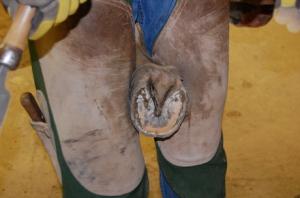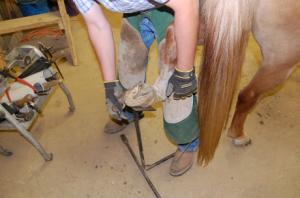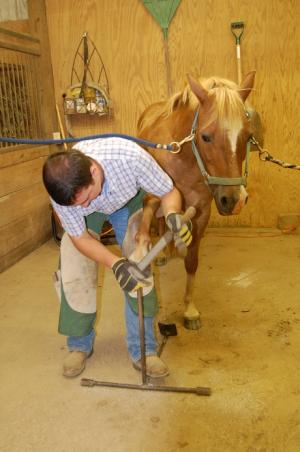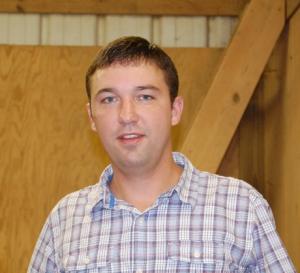By Nancy Brannon
Josh Pounders is a seasoned farrier, marking 15 years experience in the business this coming December. From the early age of ten, he was interested in horse shoeing. From that age, he remembers Tom Bishop coming by his house to shoe and trim his family’s horses. The work and the lifestyle of the itinerate farrier appealed to him, so he soon got involved with folks in that line of work.
He formed a strong interest in learning shoeing at age 13, (he’s 31 now) and in high school he worked for Jack Scott breaking horses. Jack trimmed and shod his own horses, and Josh liked that do-it-yourself, independent approach.
Right after finishing high school, around age 18, he started working for Greg Speltz, who mentored him and prepared him to start his own shoeing business. “Greg taught me all about shoeing and how to run it as a business,” Josh said. “He showed me the difference between a back yard shoer and a shoeing business. I’m still learning from him, even today, and he’s still a friend of mine.”
Josh emphasizes the need for regular hoof care, and keeping the horse as close as possible to his natural way of going. “The main thing is to trim and shoe the horse correctly and not change the way they naturally travel. They usually perform their best if you don’t try to drastically change them. Keep the horse as natural as possible for the job they’re doing.”
Josh is very conscientious about his work, since it’s his life’s passion. “I try to do the same quality of work with every horse, regardless of whether it’s an inexpensive back yard horse or a very expensive show horse. I don’t overload my schedule so that I have sufficient time to give to each horse. Horses are to some people almost like family members, so they want them to have the best care. And I want to make sure they all get what they need.”
When Josh started his farrier business at age 17, he learned from his mentor Speltz that one characteristic is to be reliable and on time, a policy he always practices. “I always try to be on time at all of my appointments,” he said. “If there are any changes, I call ahead to let my customers know. To get work when I was starting out, I was the one who was at the barn when the other farrier didn’t show up, or was late. I was, and still am, always on time.”
And, in return, he expects the customer to have the horse(s) up and ready when he gets there. When he gets through with one horse, he expects to immediately go to the next. That practice keeps him on schedule, so that customers know he will be at their barn at the appointed time.
I asked Josh about some specific hoof care issues. What about the beveled edge that natural trimmers put on a hoof? Josh answered, “If the hoof has a beveled edge, it won’t crack. It’s important to round off the edge after a trim so it won’t crack. A sharp edge is more prone to crack.”
What about corrective shoeing or trimming for conformation problems, like club foot? “If a horse has conformation problems, you can correct the problems if the horse is young. But as the horse ages and the joints are developed, don’t change the horse too much to try to correct the problem. If you do, you can actually cause damage somewhere else. For horses with problems, these problems are not corrected with one shoeing (or trimming). They are only corrected over time with your horse care professional. Consistency in hoof care is very important!”
What can you do for a foundered horse? “There is a lot you can do for this,” Josh said encouragingly. He works closely with veterinarians on foundered horses, since their needs often vary with the amount of founder. “Every case is different, depending on the amount of rotation.”
Farriers have to take care of themselves, too. “A farrier’s back is his most important tool,” Josh said, so he does all he can to protect his. “I try not to work on unruly horses. I will work with horses who have a problem, but between visits, I want to know that the owner will be doing ground work with the horse to teach him to stand and be obedient. You really can’t expect your farrier to do all you ground work for you. Farriers have to be very careful with their backs.”
Josh is a farrier during the weekdays, but on weekends he works as a Registered Nurse at Baptist DeSoto Hospital in Stepdown ICU. He’s been a nurse there for five years. “I tell my patients, I’m the only horseshoeing nurse you’ll ever meet.” While seemingly incompatible, the two jobs work well for Josh. The combination of shoeing during the week and nursing on the weekends actually gives his back a rest.
In the last couple of years, with fuel prices rising rapidly, Josh has implemented a new service. He shoes horses at his own barn one day a week at discounted rates. This gives his customers an option, especially if they can trailer several horses to his place, and also gives him a day off from using fuel.
Josh is a native of Nesbit, Mississippi and still lives on the family farm. In fact, he just moved into his new house, which he has been building, with help, for nine months. His 3 ½ year old son Jake will be the fifth generation of his family to reside on the family farm.
Jake has taken an interest in farrier work, too, and likes to travel with his dad. “He makes every step I make. He’s the light of my life!” But Josh is picky about where he allows Jake to go, so he doesn’t get hurt around the horses. “He likes to sit on people’s ponies,” Josh said. Josh has two horses of his own, one he raised from a baby and another that a customer gave him for his son.
What does Josh like most about being a farrier? “I like hands-on work. I am very particular and I like things done properly. As a kid, my biggest hobby was horses. But I never wanted to punch a clock. I’m independent and I wanted to work for myself. So I found a way to do make a living doing what I like.
“I like the travel, not being tied down to the same place every day. I like getting to know the families for whom I shoe, building relationships over time. Some of my customers are my best friends. I like watching the kids grow up.”
Josh Pounders is a seasoned farrier, marking 15 years experience in the business this coming December. From the early age of ten, he was interested in horse shoeing. From that age, he remembers Tom Bishop coming by his house to shoe and trim his family’s horses. The work and the lifestyle of the itinerate farrier appealed to him, so he soon got involved with folks in that line of work.
He formed a strong interest in learning shoeing at age 13, (he’s 31 now) and in high school he worked for Jack Scott breaking horses. Jack trimmed and shod his own horses, and Josh liked that do-it-yourself, independent approach.
Right after finishing high school, around age 18, he started working for Greg Speltz, who mentored him and prepared him to start his own shoeing business. “Greg taught me all about shoeing and how to run it as a business,” Josh said. “He showed me the difference between a back yard shoer and a shoeing business. I’m still learning from him, even today, and he’s still a friend of mine.”
Josh emphasizes the need for regular hoof care, and keeping the horse as close as possible to his natural way of going. “The main thing is to trim and shoe the horse correctly and not change the way they naturally travel. They usually perform their best if you don’t try to drastically change them. Keep the horse as natural as possible for the job they’re doing.”
Josh is very conscientious about his work, since it’s his life’s passion. “I try to do the same quality of work with every horse, regardless of whether it’s an inexpensive back yard horse or a very expensive show horse. I don’t overload my schedule so that I have sufficient time to give to each horse. Horses are to some people almost like family members, so they want them to have the best care. And I want to make sure they all get what they need.”
When Josh started his farrier business at age 17, he learned from his mentor Speltz that one characteristic is to be reliable and on time, a policy he always practices. “I always try to be on time at all of my appointments,” he said. “If there are any changes, I call ahead to let my customers know. To get work when I was starting out, I was the one who was at the barn when the other farrier didn’t show up, or was late. I was, and still am, always on time.”
And, in return, he expects the customer to have the horse(s) up and ready when he gets there. When he gets through with one horse, he expects to immediately go to the next. That practice keeps him on schedule, so that customers know he will be at their barn at the appointed time.
I asked Josh about some specific hoof care issues. What about the beveled edge that natural trimmers put on a hoof? Josh answered, “If the hoof has a beveled edge, it won’t crack. It’s important to round off the edge after a trim so it won’t crack. A sharp edge is more prone to crack.”
What about corrective shoeing or trimming for conformation problems, like club foot? “If a horse has conformation problems, you can correct the problems if the horse is young. But as the horse ages and the joints are developed, don’t change the horse too much to try to correct the problem. If you do, you can actually cause damage somewhere else. For horses with problems, these problems are not corrected with one shoeing (or trimming). They are only corrected over time with your horse care professional. Consistency in hoof care is very important!”
What can you do for a foundered horse? “There is a lot you can do for this,” Josh said encouragingly. He works closely with veterinarians on foundered horses, since their needs often vary with the amount of founder. “Every case is different, depending on the amount of rotation.”
Farriers have to take care of themselves, too. “A farrier’s back is his most important tool,” Josh said, so he does all he can to protect his. “I try not to work on unruly horses. I will work with horses who have a problem, but between visits, I want to know that the owner will be doing ground work with the horse to teach him to stand and be obedient. You really can’t expect your farrier to do all you ground work for you. Farriers have to be very careful with their backs.”
Josh is a farrier during the weekdays, but on weekends he works as a Registered Nurse at Baptist DeSoto Hospital in Stepdown ICU. He’s been a nurse there for five years. “I tell my patients, I’m the only horseshoeing nurse you’ll ever meet.” While seemingly incompatible, the two jobs work well for Josh. The combination of shoeing during the week and nursing on the weekends actually gives his back a rest.
In the last couple of years, with fuel prices rising rapidly, Josh has implemented a new service. He shoes horses at his own barn one day a week at discounted rates. This gives his customers an option, especially if they can trailer several horses to his place, and also gives him a day off from using fuel.
Josh is a native of Nesbit, Mississippi and still lives on the family farm. In fact, he just moved into his new house, which he has been building, with help, for nine months. His 3 ½ year old son Jake will be the fifth generation of his family to reside on the family farm.
Jake has taken an interest in farrier work, too, and likes to travel with his dad. “He makes every step I make. He’s the light of my life!” But Josh is picky about where he allows Jake to go, so he doesn’t get hurt around the horses. “He likes to sit on people’s ponies,” Josh said. Josh has two horses of his own, one he raised from a baby and another that a customer gave him for his son.
What does Josh like most about being a farrier? “I like hands-on work. I am very particular and I like things done properly. As a kid, my biggest hobby was horses. But I never wanted to punch a clock. I’m independent and I wanted to work for myself. So I found a way to do make a living doing what I like.
“I like the travel, not being tied down to the same place every day. I like getting to know the families for whom I shoe, building relationships over time. Some of my customers are my best friends. I like watching the kids grow up.”










